Vince Canger's blog
Food for Thought: Do Agricultural Innovations Improve Our Health?
Tue, 09/24/2013 - 17:28 — Vince Canger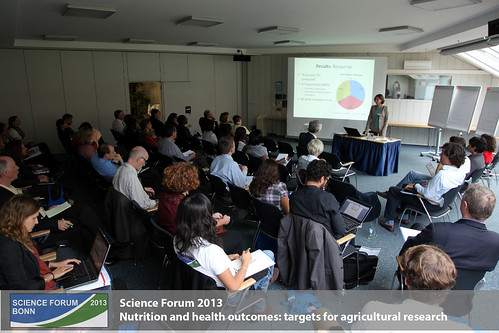 The Science Forum 2013 in Bonn, Germany, Discusses the Links between Agriculture and Health and how they can be Improved
Imagine for a moment that you're a small-scale farmer from a poor region and you grow a number of crops. Some of the crops you sell for cash which you probably use to purchase other foods you don't grow yourself, or to pay for other family expenses. The food you don't sell, you eat. But you later decide to start growing a high-yielding cotton variety with a good market demand. Your new choice in crop brings you greater income which you then use to purchase a wider range of healthier, more nutritious foods that you may not have had access to before. Such a scenario makes sense, unless you consider the contradicting evidence currently coming from research in China. (read more)
The Science Forum 2013 in Bonn, Germany, Discusses the Links between Agriculture and Health and how they can be Improved
Imagine for a moment that you're a small-scale farmer from a poor region and you grow a number of crops. Some of the crops you sell for cash which you probably use to purchase other foods you don't grow yourself, or to pay for other family expenses. The food you don't sell, you eat. But you later decide to start growing a high-yielding cotton variety with a good market demand. Your new choice in crop brings you greater income which you then use to purchase a wider range of healthier, more nutritious foods that you may not have had access to before. Such a scenario makes sense, unless you consider the contradicting evidence currently coming from research in China. (read more)
A Student's Perspective: What Was Your Favorite Presentation and Why?
Thu, 09/19/2013 - 17:22 — Vince Canger
Who are you?
Cory Whitney from the Rhein-Waal University of Applied Sciences.
What Presentation did you find most interesting on the last day of Tropentag?... (read more)
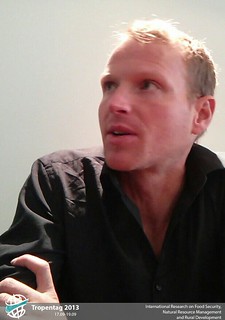

Will We Soon be Eating Food Grown in Our Own Faeces?
Thu, 09/19/2013 - 10:51 — Vince Canger
We are all quite used to the idea of fertilizing the soil with the manure of animals and usually don't think twice about it. But imagine using human manure -- even your own -- to help grow the food that you eat. Some might scoff at the idea, but it's one that many have been researching, including Jörgen Fidjeland who discussed the use of faecal sludge as fertilizer at this year's Tropentag conference at the University of Hohenheim in Stuttgart, Germany... (read more)


They Say Goats will Eat Anything -- even Charcoal
Wed, 09/18/2013 - 18:04 — Vince Canger
A team of scientists have added activated charcoal to goats' feed, utilizing the charcoal-laden faeces in attempts to decrease the amount of leaching of nitrogen and carbon in poor performing sandy soils. The results were mostly positive. But what is activated charcoal, why are they feeding it to goats, and how might it benefit soil fertility? (read more)
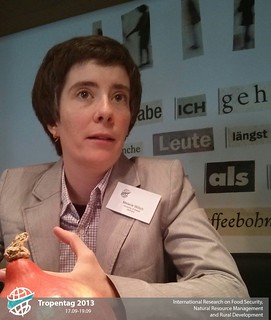

The More Mobility, the Better for Extensive Livestock Systems
Wed, 09/18/2013 - 16:42 — Vince Canger
In some of the most marginal areas of the world where arable farming is not practical, people cope and are able to survive through the raising of animals. Usually, these systems are highly mobile, meaning the livestock keeper must follow or drive their animals to different pastures and rangelands. Often, such systems are neglected or looked at as backwards, traditional or somehow out-of-style. But this year's Tropentag held a full session devoted exclusively to oral presentations on research in extensive livestock production. Here are a couple results from the session... (read more)
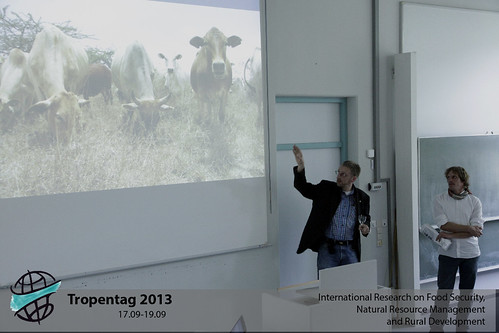

Fire Safety Challenges the Coordination of Tropentag 2013
Mon, 09/16/2013 - 15:43 — Vince Canger
This year's Tropentag is expecting a considerable turnout of over 825 registered participants representing around 80 countries.
Organisation for such a conference is no easy task, says Bärbel Sagi, Tropenzetrum employee and Tropentag coordinator. Preperations began over half a year ago... (read more)
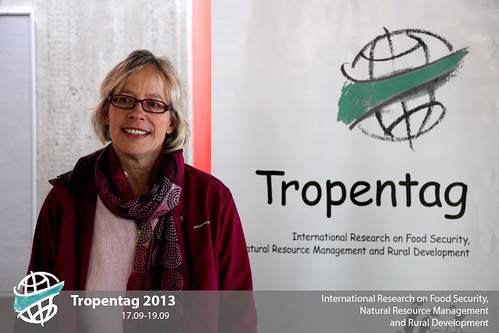

Allow Myself to Introduce... Myself
Mon, 09/16/2013 - 11:16 — Vince Canger




